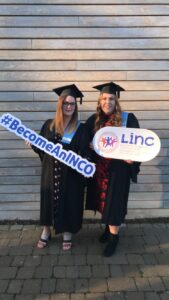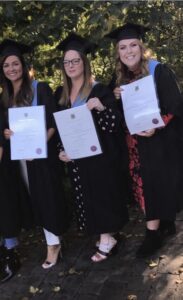 Last week saw many Early Years Professionals who undertook the LINC Programme graduate with their qualification. We are so delighted and thrilled to have four staff members, Aoife O'Connor, Julie-Marie Gibney, Dayna Teehan & Sorcha Hoey complete the programme. With Aoife based in our Xavier's After-School centre, Julie-Marie in our Tyrrelstown Pre-School and Castleknock After-School centres, Dayna in our Ongar Pre-School and After-School centre and Sorcha in our Blanchardstown Early Years centre, we have no doubt that what they all have learned throughout the past year will become a valuable asset in both their respective centres.
Last week saw many Early Years Professionals who undertook the LINC Programme graduate with their qualification. We are so delighted and thrilled to have four staff members, Aoife O'Connor, Julie-Marie Gibney, Dayna Teehan & Sorcha Hoey complete the programme. With Aoife based in our Xavier's After-School centre, Julie-Marie in our Tyrrelstown Pre-School and Castleknock After-School centres, Dayna in our Ongar Pre-School and After-School centre and Sorcha in our Blanchardstown Early Years centre, we have no doubt that what they all have learned throughout the past year will become a valuable asset in both their respective centres.
The LINC programme qualifies the graduate to become an Inclusion Coordinator in the early years setting that they work in. Part of the role of the Inclusion Coordinator is to support the inclusion of all children, and where needed, to initiate changes in the setting that will support each child’s inclusion and participation in their early years environment. The role and function of an Inclusion Coordinator is outlined in greater detail below.
Role of an Inclusion Coordinator
Leading Inclusive Practice and Pedagogy
- Leading inclusive practice, inclusive pedagogy and an inclusive culture within the setting and providing support and information to staff and parents on inclusion of all children, with reference to the Diversity, Equality and Inclusion Charter and Guidelines.
- Cascading learning throughout the staff in the setting so as to foster an inclusive culture.
- Supporting staff in the implementation of inclusive practices in curriculum planning and assessment which supports the regular reviewing of the learning environment, daily routines, activities and social interactions to enable children of all abilities and backgrounds to participate at an appropriate level in both individual and common tasks.
- Sharing learning and good practice regarding observations, documentation and curriculum planning and development, modelling good practice and utilising different strategies for collaborating with the team regarding effective communication with children, with reference to Aistear and Siolta principles and guidelines.
- Engaging with national and local developments related to inclusion in order to continue to lead the implementation of good practice in the setting.
- Engaging with ongoing CPD to ensure adherence to good practice in relation to developments within the disability sector and in relation to the inclusion of children with additional needs.
Access and Inclusion Model (AIM)
 Disseminating information on AIM, as well as on inclusion more generally, to parents and staff.
Disseminating information on AIM, as well as on inclusion more generally, to parents and staff.- Assisting with applications for supports under AIM and liaising, where necessary, with the Early Years Specialists and other professionals working with the child. This could include meeting with parents through to using the PIP portal for the AIM application.
- Liaising with Early Years Specialists to develop strategies to support participation to ensure all children and their families are supported.
- Working closely with parents and other professionals, including the Early Years Specialists in cases where a child has complex additional needs which require more targeted supports and/ or additional assistance.
- Liaising with parents and other professionals, including the Early Years Specialists and Special Education Needs Organisers (SENOs) as appropriate, to support the transition of children to primary school.
- Participating in any relevant evaluation or AIM review to inform future practice and policy developments.

Diversity, Equality & Inclusion Charter and Guidelines
- Promoting the National Inclusion Charter and supporting staff to engage with the revised Diversity, Equality and Inclusion Charter and Guidelines 2016. This may involve the Inclusion Co-ordinator using relevant sections of the Diversity, Equality and Inclusion Guidelines (exercises, critical questions and pointers) to stimulate discussion with staff and as a prompt to consider ideas for practice in facilitating an inclusive programme.
- Supporting the setting to complete and regularly review its Inclusion Policy.
Views of Children and Parents
- Advocating on behalf of children and engaging in regular consultation with children to allow their ideas, feelings and thoughts to contribute to service provision and delivery. Using feedback from children and their parents to inform the settings inclusion procedures, evaluation and to input into wider policy developments, as appropriate
(LINC Programme, (2016-2019), http://lincprogramme.ie/blog/the-role-of-inclusion-co-ordinator-explained)
 Last week saw many Early Years Professionals who undertook the LINC Programme graduate with their qualification. We are so delighted and thrilled to have four staff members, Aoife O'Connor, Julie-Marie Gibney, Dayna Teehan & Sorcha Hoey complete the programme. With Aoife based in our Xavier's After-School centre, Julie-Marie in our Tyrrelstown Pre-School and Castleknock After-School centres, Dayna in our Ongar Pre-School and After-School centre and Sorcha in our Blanchardstown Early Years centre, we have no doubt that what they all have learned throughout the past year will become a valuable asset in both their respective centres.
Last week saw many Early Years Professionals who undertook the LINC Programme graduate with their qualification. We are so delighted and thrilled to have four staff members, Aoife O'Connor, Julie-Marie Gibney, Dayna Teehan & Sorcha Hoey complete the programme. With Aoife based in our Xavier's After-School centre, Julie-Marie in our Tyrrelstown Pre-School and Castleknock After-School centres, Dayna in our Ongar Pre-School and After-School centre and Sorcha in our Blanchardstown Early Years centre, we have no doubt that what they all have learned throughout the past year will become a valuable asset in both their respective centres. Disseminating information on AIM, as well as on inclusion more generally, to parents and staff.
Disseminating information on AIM, as well as on inclusion more generally, to parents and staff.